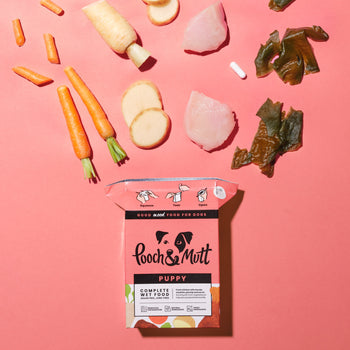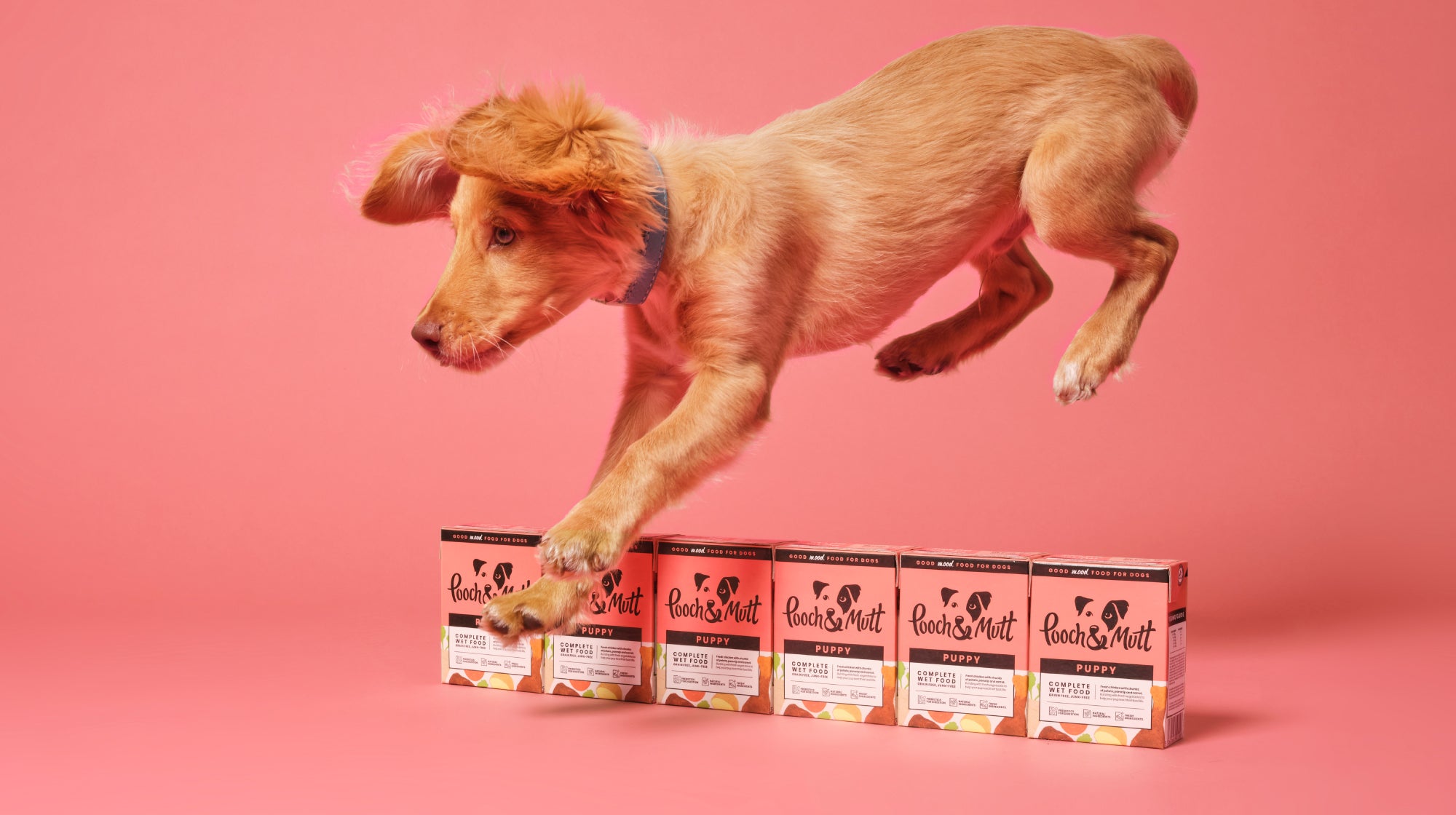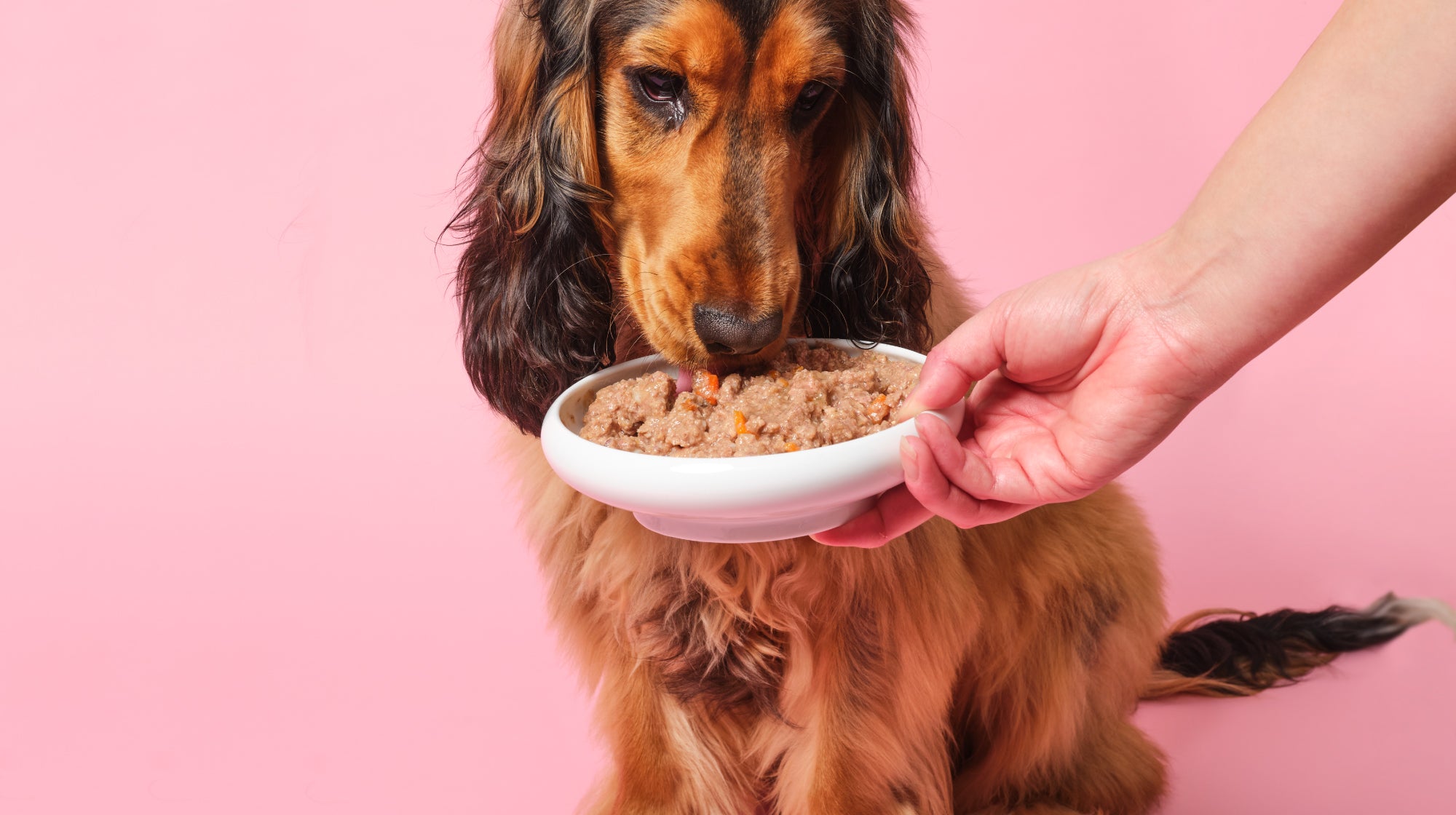
FREE UK DELIVERY ON ORDERS OVER £39.99
If you’re new to being a dog parent, or you’re switching from a dry food diet to feeding wet food to your pooch, you may have questions about what the deal is with wet food.
To lay down the basics, wet dog food is usually a jelly or gravy-covered meat feast which lots of dogs find heavenly on the palate - but if you already know that, you may still wonder about the specifics. Like ‘Is wet food bad for your dog’s teeth? Is wet food more fattening? What about puppies - can they enjoy wet food?’
There are a lot of myths out there - so read on for our answers to some FAQs about wet food for dogs.
We know that putting your dog on a wet food diet can raise a lot of questions, so let’s bust some myths and put your mind at ease…
No, dogs don’t need wet food - in fact many dogs thrive on a dry food diet without missing wet food at all. However, some dogs such as puppies (who have tiny, soft teeth) and senior dogs (whose teeth are usually past their best) may see more benefits to eating soft, wet food than dry food. Dogs with health conditions or fussy eaters may also be more likely to eat wet food as it’s more sensory and moist, therefore deemed more appetising, than dry food.
It’s completely your choice whether you feed your dog mostly dry or wet food - what matters is that it’s nutritionally complete and your dog can comfortably eat and digest it day after day.
Not at all, wet food isn’t bad for dogs - so long as it’s nutritionally balanced and contains high-quality ingredients. It’s a bit of a myth that wet dog food is more fattening (we’ll go into this below) as although it’s seen as more of a ‘treat’ than dry kibble, its lower carbohydrate level means it’s actually more often used to promote weight loss in dogs. It also has a higher moisture content than dry food, so injects some much needed hydration into a dog’s diet.
There are pros and cons to both wet and dry dog food of course, so it’s a personal choice over which you deem a better choice.
Not all wet foods rank the same - a lot of big-name commercial brands tend to stuff their wet dog food with filler ingredients such as rice or other grains, so be sure to check the nutritional information and invest in a good quality brand.
Sure - lots of dogs are on a fully wet food diet and live healthy, energetic and content lifestyles. Wet food can be exactly the same as dry food when it comes to nutritional value and digestibility, so it’s fine to only feed your dog wet food just so long as your dog responds well to it and likes to eat it.
In theory, wet food isn’t bad for dogs’ teeth - it’s just not as naturally clever as dry food which tends to naturally scrape tartar from teeth because of its gritty texture. In that respect, dogs who eat only wet food are more prone to tartar build-up.
So long as your dog receives adequate dental care, with regular check-ups, dental chews and teeth cleans, wet food shouldn’t be detrimental to your pooch’s pegs at all. In fact, for lots of dogs with problematic teeth, wet food is much more comfortable to chew.
Not necessarily - both wet and dry food can be easy to digest, it really depends on your dog’s stomach sensitivity and their specific needs. Pooch & Mutt grain-free wet food for dogs, for instance, is grain-free because many dogs can’t digest grain easily, so avoiding it proves safer on your dog’s tum.
You should always be feeding your dog based on their dietary requirements, age, breed and size. So long as your choice of dog food is tailored to their needs and is high quality, your dog shouldn’t have too many digestive issues whether they eat wet food or dry.
As mentioned previously, it’s a myth that wet dog food is more fattening than dry - in fact, it’s the opposite. Wet food usually has a lower carbohydrate content and less fat than dry food, which often contains a condensed amount of ingredients, so is usually more calorific.
Again, it’s all about the quality of food you choose to feed your dog. If it’s a wet food for dogs containing natural, nutritious ingredients, and a balanced level of protein alongside fruits and vegetables, it should actually promote leanness and weight loss in your dog.

Yes - wet food is a great choice for puppies from about six weeks old, when they’re weaning off mama dog’s milk. At this stage, their teeth are small and delicate, so dry kibble will be too severe for them to chew on. A little wet dog food will taste amazing to their inexperienced taste buds, so they’ll be more eager to chow down and use its nutrients to grow big and strong.
Senior dogs can often benefit from a switch to wet dog food. This is because at an advancing age, they’ll get a lot out of the increased moisture content in wet food, the strong aroma and flavour will encourage them to eat and build up their strength, and the softness of the meaty chunks is easier on their teeth. If your senior dog is used to dry food, perhaps try mixing a bit of wet food along with the kibble so they will benefit from wet food’s sensory and nutritional properties.
Some dog owners like their pooch to have a warm meal, and why not? Wet food is often chilled in the fridge once opened, which can reduce the lovely taste and texture of wet dog food, so it’s a good idea to heat it up and reinvigorate the flavour and smells.
To safely heat wet dog food, you could add a bit of warm water to the bowl, put it in a plastic bag and immerse it in hot water, or heat it up in the microwave (though some believe microwaves can reduce the nutritional value of the food, so do this sparingly).
In any case, be extra certain that the food isn’t scolding hot, but warm, before serving it to your hungry pup.

Let’s finish off this doggy inquisition into wet dog food with a few final myth busters.
Nope - wet food doesn’t cause weight gain, in fact, it’s often used in a weight controlled diet instead of dry food to keep your dog lean because it has a lower carbohydrate content than dry food. However, a low-quality wet food full of fat and filler ingredients could cause your dog to pile on the pounds. Be sure to choose nutritious, delicious wet dog food packed with natural, high-quality ingredients.
If your dog has a case of the runs, it’s unlikely that their wet food diet is the culprit. There are a few reasons your dog may have unconventional poop symptoms, such as food poisoning, stress, a change of environment, or eating something harmful they may have found in the house or out on a walk.
If your dog is a grazer, and so wet food is stewing in their dog bowl all through the day, that could cause harm to your dog’s gut as the left food may go off and pick up bacteria. For a grazing dog, it could be a better idea to put them on a dry food diet, and perhaps feed them wet food as an occasional treat.
There doesn’t appear to be any evidence for this! There are plenty of reasons your dog might poop more excessively, however - their diet may have been changed and their gut is getting used to the shift; a recent stressful situation such as a new dog, a visit to the vet or a house move; or a bout of food poisoning, perhaps due to bacteria in their food. On its own, no - wet food shouldn’t make your dog poop more often.
Hopefully that should cover all your wet dog food queries and have you feeling able to confidently choose whether wet food is right for you and your pooch. Take a look at our range of organic grain-free wet dog food for every dog’s need, or if you have any other questions, get in touch with us and leave a comment.
Comments (8)
I have 2 mini schnauzer that have been diagnosed with a liver issue. They currently take Denamarin daily. They are on the Hills kibble for Liver. Is soft food bad for dogs and if so in what way is it not good for them? They are 2 yrs old. One weighs 3 lbs and the other weighs 7.8 lbs.
Hello is it ok to mix dry and wet food for a puppy
Thanks
Karl @ rocco
Can I feed my 7 month Cocker Spaniel wet food in the morning and dry food in the evening?
Hi Laura,
Soft food isn’t bad for dogs at all, its personal pooch preference on whether they prefer hard or soft foods. We would just want to ensure they are having their teeth cleaned, as harder food can help with plaque removal. :)
Hi Karl,
Absolutely! We would advise adjusting the feeding guidelines slightly to allow for the extra calories from wet food and if you would like to get in touch with the team on [email protected] we can guide you through this.
Hi Polly,
Absolutely! You would just need to halve the daily feeding guidelines for both wet and dry, to ensure we aren’t overfeeding. :)
Will feeding wet cause bad habits? Vet staff told ms this. .
????
Wet food contains more moisture and generally has a stronger smell than dry food, so you may find once you start feeding your pooch wet food they may not want just dry food alone – as the scent isn’t as strong and appetising, which could be what the vet staff are referring to. :)
Leave a comment